- Home
- Pat Conroy
The Death of Santini Page 4
The Death of Santini Read online
Page 4
My father did not attend my graduation at The Citadel; nor did he ever see me outfitted in the full dress of a Friday parade. During my four years there, he never made a single appearance on campus and never took any interest in my college life. I remember calling Dad for help only one time, and his response to me played a large part in shaping my entire life.
During my sophomore year, I enrolled in air force pilot training that would begin the following summer. It was 1964 and the conflict in Vietnam was escalating at an alarming rate. My father would be sent to that war zone the following year. Patriotism was religion at The Citadel, where I didn’t hear a radical or discordant note about America’s participation in the war. At evening mess, they began to recite the names of Citadel grads who had lost their lives in battle. By my senior year, I knew grads whose names were called. I would lose eight of my classmates, including four boys I loved. The Vietnam War still stings in my memory.
I arrived at The Citadel as patriotic as any boy in America. That is how my parents raised me, and I’m still comfortable with that honorary designation. I came to college thinking I would one day take off from a carrier deck as a hotshot pilot in my father’s squadron. Already I’d developed a fascination for military tactics and the infinite patience it took to form a plan of battle. I had walked the battlefields of Gettysburg, First Manassas, Vicksburg, and Kennesaw. In high school, a beloved teacher, Joseph Monte, had gotten me to read Thucydides on the Spartan battle of Thermopylae. I shivered with delight when I read the quote of the Spartan commander: “They have the numbers; we, the heights.”
It was the first bit of military tactics I memorized, and it resonated like poetry with me. But my attraction to the rules of battle did not contribute to the flow of another habit I brought to the world of ideas—my need to read everything written down about a subject before I could render a judgment on it. The Citadel’s library served up a slender, inauspicious collection of books on Vietnam, but I stumbled on the works of Bernard Fall, who introduced me to his assessment of French colonial warfare in Vietnam. In a public speaking course, I wrote up and delivered a speech on Dien Bien Phu, a classic battle where the French forces found themselves overrun and defeated by a Vietnamese army in the highlands. Several cadets told me that my speech had nearly put them to sleep because no one in the class had ever heard of the battle of Dien Bien Phu. Both The Citadel and America would soon learn you shouldn’t fall asleep when you’re receiving information about Ho Chi Minh and the military generals he put into the field.
As part of my air force training, I accompanied several busloads of my classmates out to receive our physicals for flight school. I remember my excitement as we drove onto the base. I was surrounded by classmates such as Charlie Buzze and Johnny Sams, who went on to have distinguished careers as air force pilots. Unlike me, they were excellent cadets filled with a fervent spirit for The Citadel I could not even pretend to match. But I thought I would one day outfly the best of them, that I’d one day fly in my father’s squadron, and that I would take to the air against him and kick his ass during a maneuver that involved simulated air-to-air combat. These were the dreams I took from the fighter pilot’s household.
My physical was going fine as I performed the tasks that were simple for any college athlete. Then I lined up with a whole herd of boys for an exhaustive series of eye tests that were the most essential part of a pilot’s physical exam. In the first exam, the doctor shocked me by saying, in front of my classmates, that I was so nearsighted I’d never qualify for a pilot’s license. Trembling, I stumbled into the next booth, where I was tested for color blindness. I flipped through a book with pages blotched with different colors, but revealing a number hidden away in the fields of color. I got the first five numbers right, then turned the page and didn’t see any. The doctor announced that I was red-green color-blind, the kiss of death for a fighter pilot. In the next test, they discovered I had the worst case of depth perception ever seen at a testing of Citadel men who had received the call to be pilots.
“No wonder I can’t shoot a basketball,” I said to myself.
When I left the Charleston Air Force Base that day, I had flunked every single eye test that a man could use to his advantage as he flew through enemy air corridors. I was a washout even before I got started. Devastated, I returned to campus.
But I held on to a single, last-minute hope. The next day I called my father at his desk at the Pentagon, where he now worked, and told him what had happened to me at the physical. Though I despaired initially, I had held on to the many times when my father had made phone calls on behalf of other aviators’ sons to get them waivers for their failed tests. He had made it look easy when fighting for the other flyboys’ kids, but he wouldn’t even make a call for his own son. He thought Marine aviation would be a much better place without me up in the air with my color-blind ass.
“Dad, just get me a waiver. That’s all I’m asking,” I pleaded.
“Negative,” he said, infuriating me.
“You’ve done it for other Marine kids, Dad. I’ve heard you do it.”
“You’ve got bad peepers, son,” Dad said. “I don’t want anyone in my squadron who’s got bad peepers. And you got the worst I’ve ever heard of. You’ve got your mother’s eyeballs. Too bad for you. But good for the corps.”
“I wanted to fly like you did,” I said.
“Tough titty, winkie dink,” Dad said. “Look, you might be able to make it in the infantry. You’ll never be a fighter pilot. But hey, if you’re a grunt fighting on the ground, I might do you a big favor and dip my wings to say howdy when I pass overhead.”
My military career ended at that moment.
• • •
My father quivered with joy over my failure to become a fighter pilot. He had always referred to me as a “shit basketball player,” even though I became captain and most valuable player in my senior year at The Citadel. When I made gold stars in academic achievement, he mocked my 3.8 GPA as a demonstration of my love for pussies and faggots who wrote froufrou poetry. Where I was concerned, he remained unimpressible, but I don’t think I ever stopped trying to please him. My father treated me with a permafrost persona, making him as approachable to me as an Alp. He was all snowdrift and glacier without a demilitarized zone in his makeup. But he taught me how to hate. My God, he taught that lesson well.
But the Vietnam War was a battle I had to wage inside myself, and I read everything I could about it. The zeitgeist swept me up in the gun sight of anxiety that was fixing America in its crosshairs. At The Citadel I didn’t hear a discouraging vowel uttered against the war, and I found this intellectually repellent. I couldn’t find a good reason for the search-and-destroy missions; nor have I heard of one since. My father had taught me the doctrine of the folly of fighting a land war in Asia, and the Vietnam War stood in as a substitute for a petri dish, proving his theory. In my AF ROTC class, I devised an air battle plan where I took out every dam and wharf in Hanoi, but was told that my targets were off-limits. Though I would have the city of Hanoi swimming and their water supply destroyed, I flunked the assignment because I’d not followed the rules of engagement. Finally, I could see no difference between the Vietnamese trying to control their own destiny and the American colonists rebelling to decide their own fate. Even though I’ve had harrowing second thoughts about my actions during that war and wished I’d gone in as a Marine lieutenant, I don’t think I was wrong about the futility and fatuousness of that conflict. Smart governments fight only wars they intend to win. Fifty thousand names on that slab of immemorial marble in D.C., and I can’t blow up the dams and harbors around Hanoi? I should’ve served my country, but did not. But if America could not convince a military brat like me that it was doing the right thing, it was going to have to come up with a hell of a sales pitch for the rest of the country. I said no to the war, and it makes no difference if I think I was right or wrong. I marched in peace demonstrations in five cities as eight of my classmates were being
cut up and outfitted for body bags in Vietnam. The war gleams like a bloody wound on my generation’s soul, and I’m scarred by both sides.
I left the graduation stage at The Citadel and took a job teaching psychology at Beaufort High School, where I’d graduated four years earlier. In Beaufort, I rented a small cottage, since my parents were now living in Hawaii. I fell in love with teaching, and thought I’d be doing it for the rest of my life. The students I met in the next two years changed my perception of myself, since they found me hilarious, and not bad to look at (according to my female students). I’d never known either of those things about myself.
At night I wrote poetry in my cottage that overlooked the Beaufort River and did some innocent, though fixable, damage to the English language. In the American Government course I taught, I brought in Marines who’d fought in battles around Vietnam, as well as antiwar activists who were eloquent in their refusal to accept the premises of that war. The debates were fierce and stimulating. I thought a class functioned best as an honorable field where all ideas were welcome visitors.
In those years following my graduation, Citadel classmates began to argue with me about the wrongness or rightness of the Vietnam War. By then several of them were veterans of battle. Steve Grubb, for example, had been severely wounded in the foot, so that I had to help him into my house as he struggled with his crutches. Steve, who had been president of the honor court, a member of the sword drill, and a battalion major voted most likely to succeed, had been my model of the perfect cadet when I was at The Citadel. Although I revered him, we argued long into the night about the war. As low tide changed to high and the sun rose, we were still tossing ideas back and forth. When I helped him out to the car, we hugged each other hard, and I thanked him for his visit.
I didn’t think to thank Steve Grubb for his service to his country, however. It never crossed my mind to thank him for shedding his blood, and the numerous medals he had won for valor. That’s how a gentleman and a son of the South, a Citadel man and a true liberal, would’ve handled that most delicate situation.
Four months after my meeting with Steve Grubb, I walked into my new job on Daufuskie Island, where I became the first white person to teach black children in that part of the Jim Crow South. Already, the sixties had me by the throat.
CHAPTER 3 •
Daufuskie Island
My childhood was but prelude and crucible for the mess I was about to make of my adult life. On October 10, 1969, when I married Barbara Jones, a Vietnam War widow with two small children, I was in my first months of teaching on Daufuskie Island, a position I took after two years teaching at Beaufort High. I was proud of the job and aware of its historical significance, and was starting to make some headway with children who had been intellectually murdered at birth. None of the Daufuskie kids or their parents were told that a white teacher was coming to the Mary Fields School that September. It had shocked the island when I stood waiting as the school bus pulled up on the first day. Later, some of the kids admitted they thought the school board might have sent a deranged Klansman to torment them and spy on their families. It was a job that would unsettle my life and cause me to take stock of my centrifugal attraction to storm and battle. I was an impulsive, combative young man lacking any skills for compromise and diplomacy.
Because my wife, Barbara, would not consider raising her two young daughters on an isolated South Carolina island that housed witch doctors but no licensed MDs, and lacked paved roads, telephones, or a store of any kind, we had to buy a house in Beaufort.
I owned a house before my parents did. Barbara and I purchased a two-story, many-columned, slightly run-down house on the “Point,” what Beaufort’s historic district is called. Because of the Marine Corps, I had grown up in house trailers and Quonset huts and Capehart housing from El Toro to Camp Lejeune. No one ever wanted to own a house more than I did. To me, our house was a mansion, even though it was built around the turn of the century and lacked the panache of the antebellum homes that flanked both sides of 403 Hancock Street. On the day we moved in, Barbara and I lifted wineglasses to each other as we sat on the second-story balcony hidden from the street by the feathery stutter of palmetto fronds shaken by a salt wind off the river. I felt like I had bought a palace for my wife, my children, and for me, and I still think that over forty years later.
The following summer, my entire family came to Beaufort to stay with Barbara and me at our new house while waiting for their own house to be ready, not too far from mine. Dad had received orders for his second tour of Vietnam, and they were returning to the States after being stationed in Hawaii. My mother had rented a house on East Street, only three blocks away, but repairs on it would not be completed for three weeks. I could not wait for everyone to see the extraordinary house we had bought and begun to fix up. Famous among my friends for lacking the skills of a handyman, I had become somewhat sufficient in minor repair work and was astonished to realize my favorite store in town had become Fordham’s Hardware. My brothers and sisters had never seen me hold a tool in my hand, and I could not wait to hammer a nail for them. That my family was going to be staying with me pleased me beyond all reckoning. By buying this house, I had discovered that I had a gift for hospitality. Barbara and I loved inviting people to our home for rest and conversation, for good food and drink and safe harbor. When they arrived, my family was stunned by the house’s size and grandeur. I kissed my mother, and she whispered, “Careful, Pat. Your father’s on the warpath.” And of course, she was right.
My father was leaving that July for his second tour of duty in South Vietnam, and he never had a meaner summer in his violent, disgraceful life. From the moment he entered my house, I thought Don Conroy and I would come to blows every time we passed each other in that spacious, wonderful home.
“My, my, you must think you’re quite the Southern gentleman,” he said, the only time he referred to the house.
He was on the prowl and dangerous, and my mother’s hatred of him was now an open wound between them. They could barely utter a civil word to each other except when Barbara was around. Then they would playact as though the Conroys were an upstanding family and not the American tragedy we insiders knew us to be. My mother’s beautiful face had a haunted, frantic look, and my father’s eyes were withering and cruel. In the family lore, the Conroy children will often try to select my father’s worst and most out-of-control years, and 1970 always rears its violent head and captures a couple of votes. My contempt of him was now a wordless, unsigned agreement between us. I looked at him with loathing and he returned it with equal and passionate measure.
All this the Conroy family had managed to hide from everybody. Barbara became the latest victim of the elaborate opera of evasion. She thought my family was hilarious and rambunctious and fun to be around. But that would come apart on the night known in the annals of my brothers and sisters as movie night with the Conroy family. Mom and Dad had taken the four kids—Kathy, Jim, Tim, and Tom (Carol Ann and Mike had gone off to college by then)—to the movies over at Parris Island. I felt the tension in the house subside when my father went out the front door and pulled his car down the street, his family silent around him. He looked mean enough to carry claymore mines in his cheeks, and I was happy to see him gone. In a week, he would leave for Vietnam, which made me like the war, because it took him off to Asia every couple of years, and I knew my mother and the kids were safe from his fists.
I was asleep at eleven thirty when I heard the ancient, ordained noises below. Like an aroused lion, I awoke to the sound of my mother’s sobbing and of a hand slapping her face. Then I heard my brothers and sisters trying to suppress their own weeping while my father whispered for them to shut up. Here I came, a deadly young man of twenty-five, and a game one, too. I slipped into my jeans and Docksiders, and I came down the steps noiseless as a serpent. I witnessed the next slap to my mother, and something snapped in me, became unglued, and I drove my shoulder into my drunken father like a linebacker takin
g on a fullback in a dive play. I drove him out of the foyer, through the screen door, and laid him out on the floorboards of the first-floor veranda. Rising fast, I kicked my drunken father down the steps and across the front yard. Then I lifted him up, punched his ugly face, placed him behind the wheel of his car, and said, “You ever touch my mother again and I’ll kill you. You ever touch my brothers and sisters again and I’ll beat you with a tire iron until your heart stops and my arm gets tired. You get it, you worthless son of a bitch? That’s the last time, pal. The last time in this lifetime. Got it? Now, you get your drunken, worthless ass out of my yard, and never darken the door of my house again.”

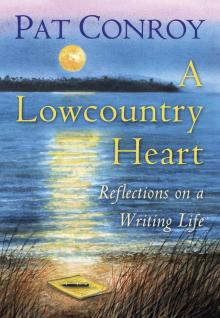 A Lowcountry Heart: Reflections on a Writing Life
A Lowcountry Heart: Reflections on a Writing Life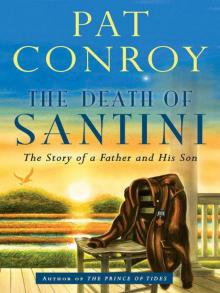 The Death of Santini: The Story of a Father and His Son
The Death of Santini: The Story of a Father and His Son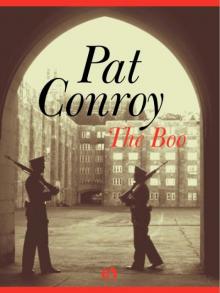 The Boo
The Boo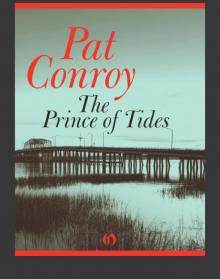 The Prince of Tides
The Prince of Tides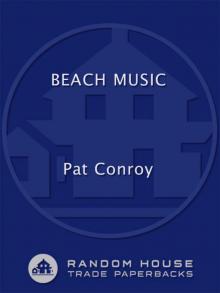 Beach Music
Beach Music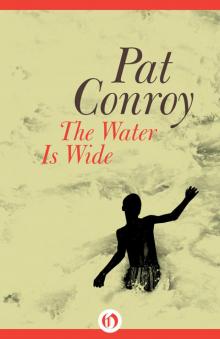 The Water Is Wide
The Water Is Wide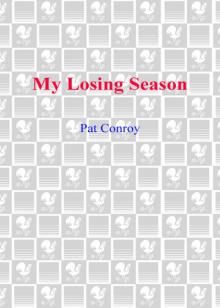 My Losing Season
My Losing Season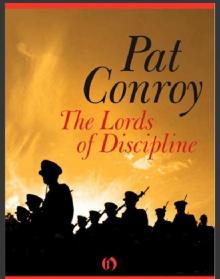 The Lords of Discipline
The Lords of Discipline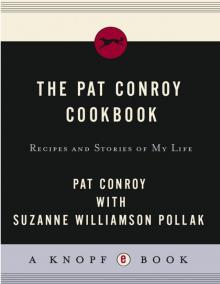 Pat Conroy Cookbook
Pat Conroy Cookbook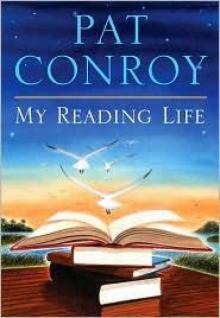 My Reading Life
My Reading Life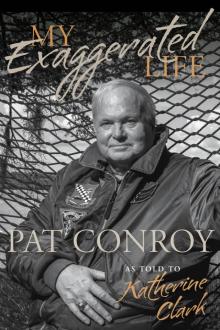 My Exaggerated Life
My Exaggerated Life The Pat Conroy Cookbook
The Pat Conroy Cookbook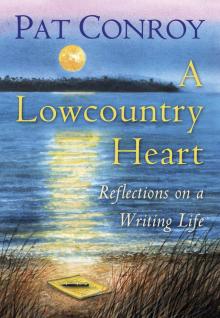 A Lowcountry Heart
A Lowcountry Heart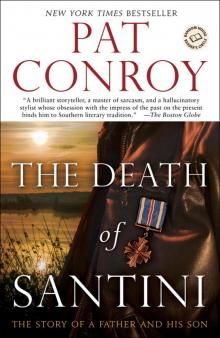 The Death of Santini
The Death of Santini